Abstract
Apolipoprotein-E epsilon 4 (APOE-epsilon 4) has been consistently associated with Alzheimer disease (AD) and may be responsible for an earlier age at onset. We have previously reported a diminished association between APOE-epsilon 4 and AD in African Americans. Using a new method, which allows inclusion of censored information, we compared relative risks by APOE genotypes in an expanded collection of cases and controls from three ethnic groups in a New York community. The relative risk for AD associated with APOE-epsilon 4 homozygosity was increased in all ethnic groups (African American relative risk [RR]=3.0; 95% confidence interval [CI]=1.5-5.9; Caucasian RR=7.3, 95% CI=2.5-21.6; and Hispanic RR=2.5, 95% CI=1.1-5.7), compared with those with APOE-epsilon 3/epsilon 3 genotypes. The risk was also increased for APOE-epsilon 4 heterozygous Caucasians (RR=2.9, 95% CI=1.7-5.1) and Hispanics (RR=1.6, 95% CI=1.1-2.3), but not for African Americans (RR=0.6, 95% Ci=0.4-0.9). The age distribution of the proportion of Caucasians and Hispanics without AD was consistently lower for APOE-epsilon 4 homozygous and APOE-epsilon 4 heterozygous individuals than for those with other APOE genotypes. In African Americans this relationship was observed only in APOE-epsilon 4 homozygotes. These results confirm that APOE genotypes influence the RR of AD in Caucasians and Hispanics. Differences in risk among APOE-epsilon 4 heterozygote African Americans suggest that other genetic or environmental factors may modify the effect of APOE-epsilon 4 in some populations.
Full text
PDF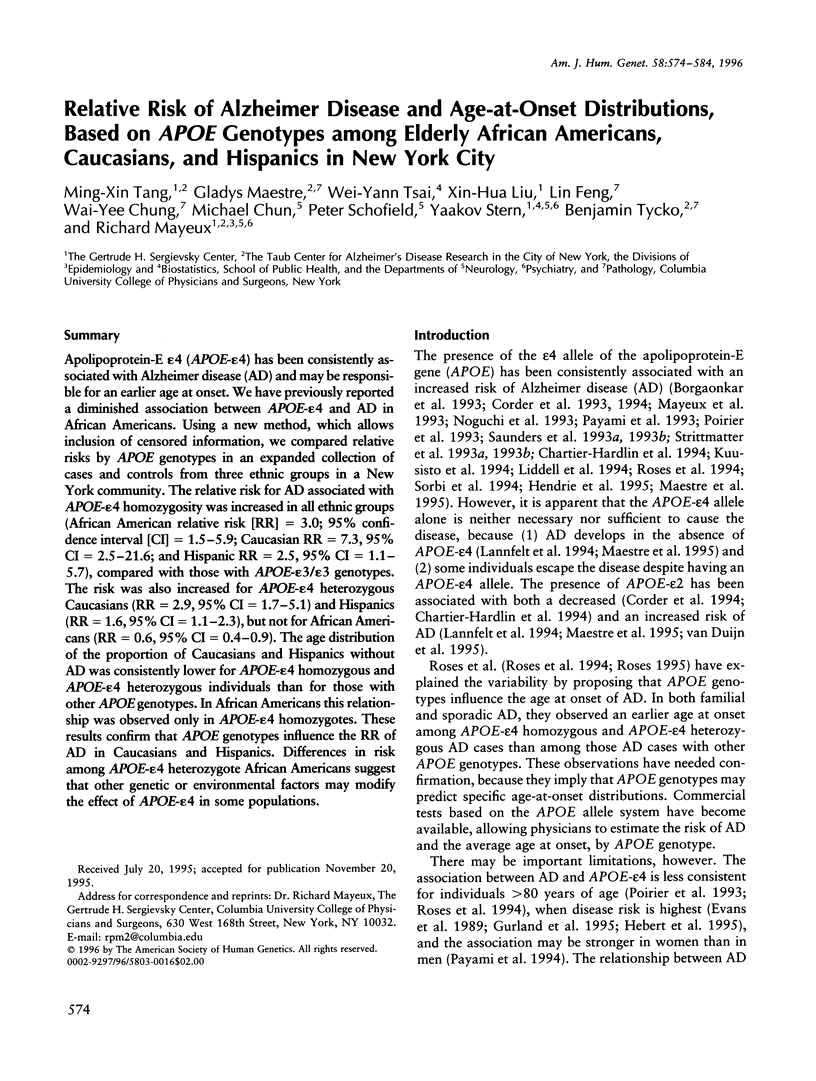
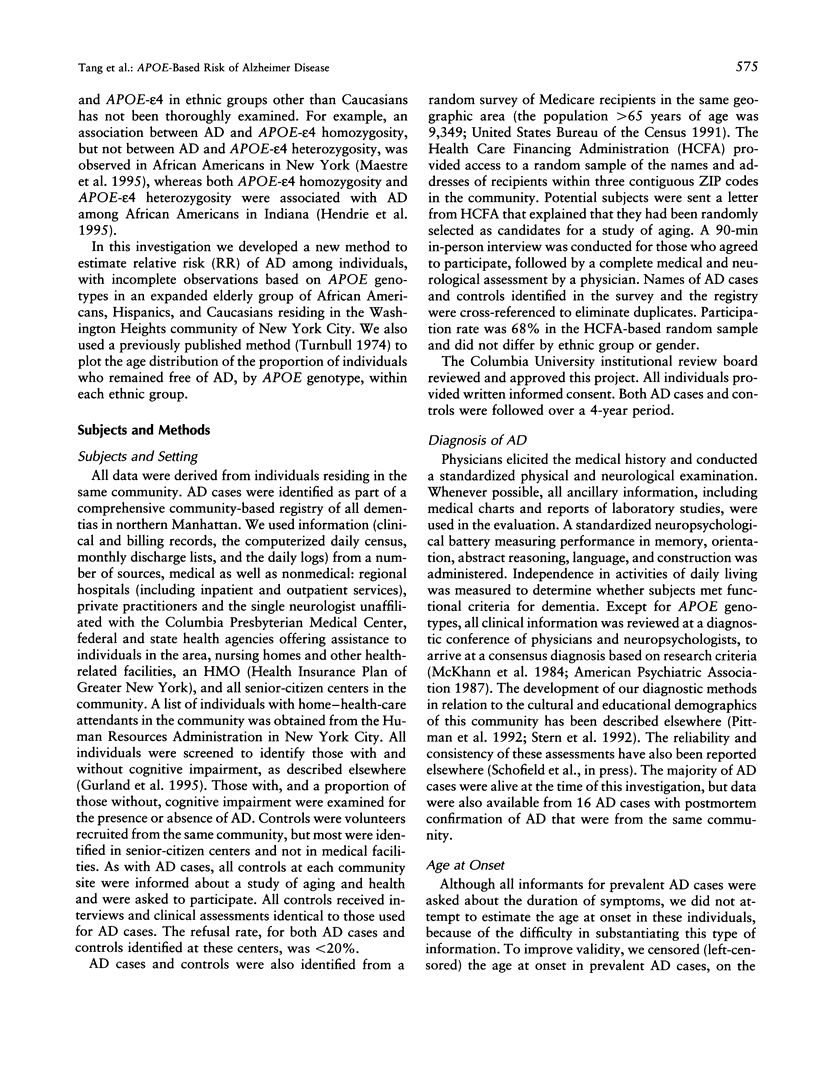
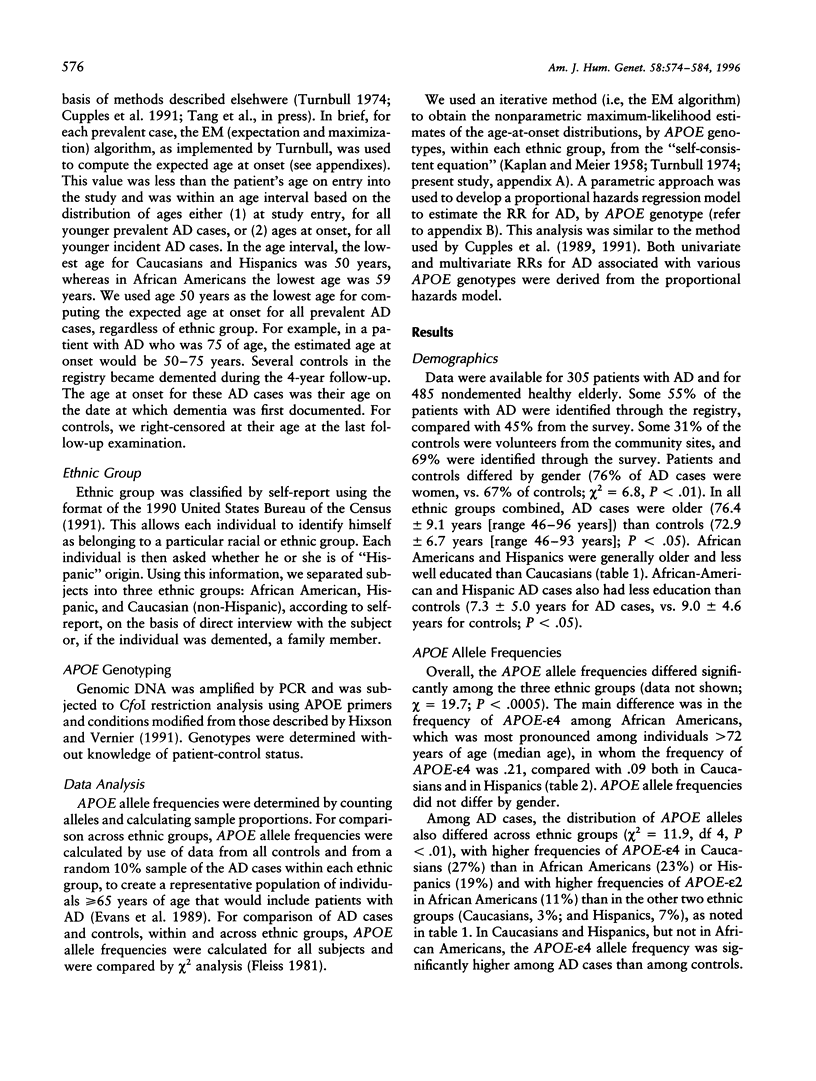


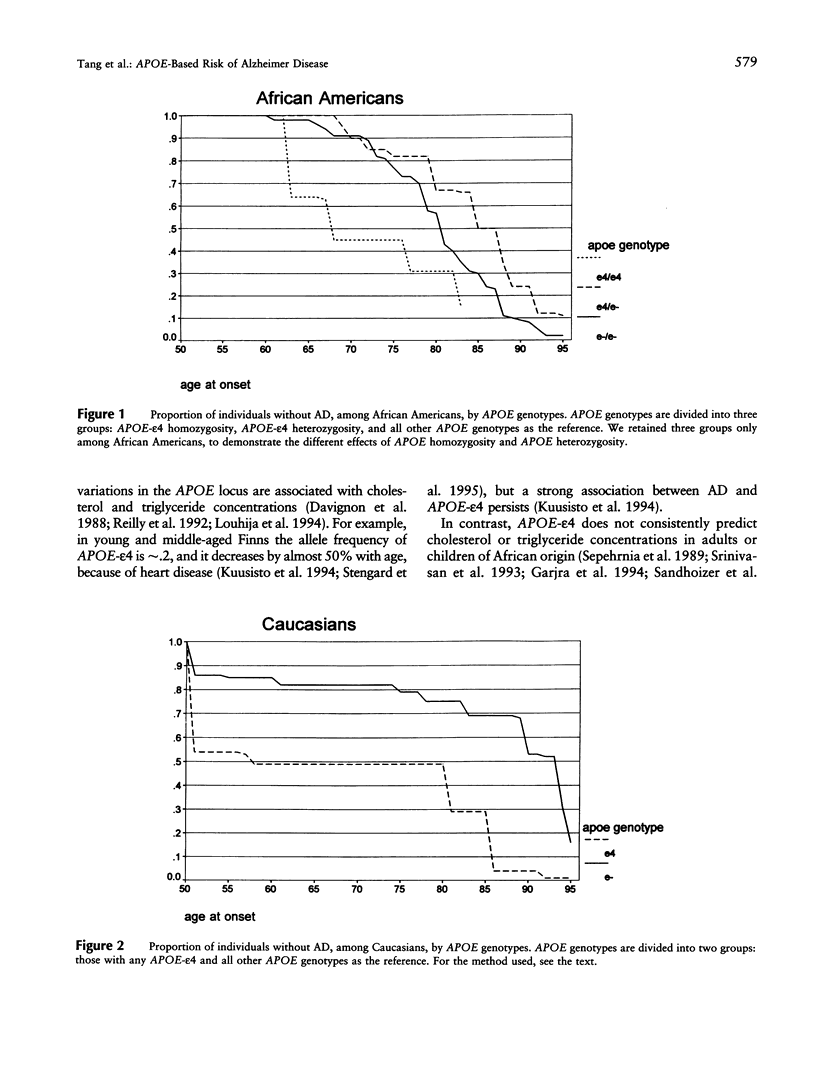


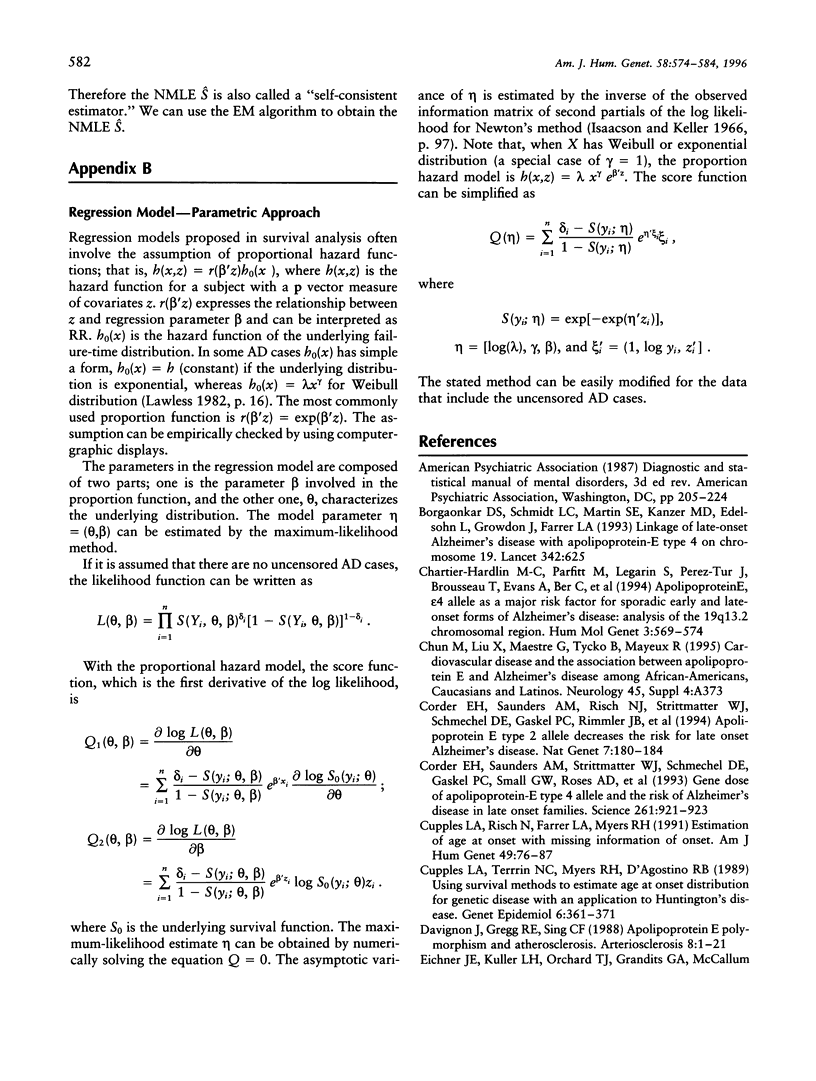


Selected References
These references are in PubMed. This may not be the complete list of references from this article.
- Borgaonkar D. S., Schmidt L. C., Martin S. E., Kanzer M. D., Edelsohn L., Growdon J., Farrer L. A. Linkage of late-onset Alzheimer's disease with apolipoprotein E type 4 on chromosome 19. Lancet. 1993 Sep 4;342(8871):625–625. doi: 10.1016/0140-6736(93)91458-x. [DOI] [PubMed] [Google Scholar]
- Chartier-Harlin M. C., Parfitt M., Legrain S., Pérez-Tur J., Brousseau T., Evans A., Berr C., Vidal O., Roques P., Gourlet V. Apolipoprotein E, epsilon 4 allele as a major risk factor for sporadic early and late-onset forms of Alzheimer's disease: analysis of the 19q13.2 chromosomal region. Hum Mol Genet. 1994 Apr;3(4):569–574. doi: 10.1093/hmg/3.4.569. [DOI] [PubMed] [Google Scholar]
- Corder E. H., Saunders A. M., Risch N. J., Strittmatter W. J., Schmechel D. E., Gaskell P. C., Jr, Rimmler J. B., Locke P. A., Conneally P. M., Schmader K. E. Protective effect of apolipoprotein E type 2 allele for late onset Alzheimer disease. Nat Genet. 1994 Jun;7(2):180–184. doi: 10.1038/ng0694-180. [DOI] [PubMed] [Google Scholar]
- Corder E. H., Saunders A. M., Strittmatter W. J., Schmechel D. E., Gaskell P. C., Small G. W., Roses A. D., Haines J. L., Pericak-Vance M. A. Gene dose of apolipoprotein E type 4 allele and the risk of Alzheimer's disease in late onset families. Science. 1993 Aug 13;261(5123):921–923. doi: 10.1126/science.8346443. [DOI] [PubMed] [Google Scholar]
- Cupples L. A., Risch N., Farrer L. A., Myers R. H. Estimation of morbid risk and age at onset with missing information. Am J Hum Genet. 1991 Jul;49(1):76–87. [PMC free article] [PubMed] [Google Scholar]
- Cupples L. A., Terrin N. C., Myers R. H., D'Agostino R. B. Using survival methods to estimate age-at-onset distributions for genetic diseases with an application to Huntington disease. Genet Epidemiol. 1989;6(2):361–371. doi: 10.1002/gepi.1370060206. [DOI] [PubMed] [Google Scholar]
- Davignon J., Gregg R. E., Sing C. F. Apolipoprotein E polymorphism and atherosclerosis. Arteriosclerosis. 1988 Jan-Feb;8(1):1–21. doi: 10.1161/01.atv.8.1.1. [DOI] [PubMed] [Google Scholar]
- Eichner J. E., Kuller L. H., Orchard T. J., Grandits G. A., McCallum L. M., Ferrell R. E., Neaton J. D. Relation of apolipoprotein E phenotype to myocardial infarction and mortality from coronary artery disease. Am J Cardiol. 1993 Jan 15;71(2):160–165. doi: 10.1016/0002-9149(93)90732-r. [DOI] [PubMed] [Google Scholar]
- Evans D. A., Funkenstein H. H., Albert M. S., Scherr P. A., Cook N. R., Chown M. J., Hebert L. E., Hennekens C. H., Taylor J. O. Prevalence of Alzheimer's disease in a community population of older persons. Higher than previously reported. JAMA. 1989 Nov 10;262(18):2551–2556. [PubMed] [Google Scholar]
- Gajra B., Candlish J. K., Saha N., Mak J. W., Tay J. S. Effect of apolipoprotein E variants on plasma lipids and apolipoproteins in the Orang Asli ('aborigines') of Malaysia. Hum Hered. 1994 Jul-Aug;44(4):209–213. doi: 10.1159/000154219. [DOI] [PubMed] [Google Scholar]
- Hallman D. M., Boerwinkle E., Saha N., Sandholzer C., Menzel H. J., Csázár A., Utermann G. The apolipoprotein E polymorphism: a comparison of allele frequencies and effects in nine populations. Am J Hum Genet. 1991 Aug;49(2):338–349. [PMC free article] [PubMed] [Google Scholar]
- Hebert L. E., Scherr P. A., Beckett L. A., Albert M. S., Pilgrim D. M., Chown M. J., Funkenstein H. H., Evans D. A. Age-specific incidence of Alzheimer's disease in a community population. JAMA. 1995 May 3;273(17):1354–1359. [PubMed] [Google Scholar]
- Hendrie H. C., Hall K. S., Hui S., Unverzagt F. W., Yu C. E., Lahiri D. K., Sahota A., Farlow M., Musick B., Class C. A. Apolipoprotein E genotypes and Alzheimer's disease in a community study of elderly African Americans. Ann Neurol. 1995 Jan;37(1):118–120. doi: 10.1002/ana.410370123. [DOI] [PubMed] [Google Scholar]
- Hixson J. E., Vernier D. T. Restriction isotyping of human apolipoprotein E by gene amplification and cleavage with HhaI. J Lipid Res. 1990 Mar;31(3):545–548. [PubMed] [Google Scholar]
- Kamboh M. I., Sepehrnia B., Ferrell R. E. Genetic studies of human apolipoproteins. VI. Common polymorphism of apolipoprotein E in blacks. Dis Markers. 1989 Jan-Mar;7(1):49–55. [PubMed] [Google Scholar]
- Kervinen K., Savolainen M. J., Salokannel J., Hynninen A., Heikkinen J., Ehnholm C., Koistinen M. J., Kesäniemi Y. A. Apolipoprotein E and B polymorphisms--longevity factors assessed in nonagenarians. Atherosclerosis. 1994 Jan;105(1):89–95. doi: 10.1016/0021-9150(94)90011-6. [DOI] [PubMed] [Google Scholar]
- Kuusisto J., Koivisto K., Kervinen K., Mykkänen L., Helkala E. L., Vanhanen M., Hänninen T., Pyörälä K., Kesäniemi Y. A., Riekkinen P. Association of apolipoprotein E phenotypes with late onset Alzheimer's disease: population based study. BMJ. 1994 Sep 10;309(6955):636–638. doi: 10.1136/bmj.309.6955.636. [DOI] [PMC free article] [PubMed] [Google Scholar]
- Lannfelt L., Lilius L., Nastase M., Viitanen M., Fratiglioni L., Eggertsen G., Berglund L., Angelin B., Linder J., Winblad B. Lack of association between apolipoprotein E allele epsilon 4 and sporadic Alzheimer's disease. Neurosci Lett. 1994 Mar 14;169(1-2):175–178. doi: 10.1016/0304-3940(94)90384-0. [DOI] [PubMed] [Google Scholar]
- Liddell M., Williams J., Bayer A., Kaiser F., Owen M. Confirmation of association between the e4 allele of apolipoprotein E and Alzheimer's disease. J Med Genet. 1994 Mar;31(3):197–200. doi: 10.1136/jmg.31.3.197. [DOI] [PMC free article] [PubMed] [Google Scholar]
- Louhija J., Miettinen H. E., Kontula K., Tikkanen M. J., Miettinen T. A., Tilvis R. S. Aging and genetic variation of plasma apolipoproteins. Relative loss of the apolipoprotein E4 phenotype in centenarians. Arterioscler Thromb. 1994 Jul;14(7):1084–1089. doi: 10.1161/01.atv.14.7.1084. [DOI] [PubMed] [Google Scholar]
- Luc G., Bard J. M., Arveiler D., Evans A., Cambou J. P., Bingham A., Amouyel P., Schaffer P., Ruidavets J. B., Cambien F. Impact of apolipoprotein E polymorphism on lipoproteins and risk of myocardial infarction. The ECTIM Study. Arterioscler Thromb. 1994 Sep;14(9):1412–1419. doi: 10.1161/01.atv.14.9.1412. [DOI] [PubMed] [Google Scholar]
- Maestre G., Ottman R., Stern Y., Gurland B., Chun M., Tang M. X., Shelanski M., Tycko B., Mayeux R. Apolipoprotein E and Alzheimer's disease: ethnic variation in genotypic risks. Ann Neurol. 1995 Feb;37(2):254–259. doi: 10.1002/ana.410370217. [DOI] [PubMed] [Google Scholar]
- Mayeux R., Stern Y., Ottman R., Tatemichi T. K., Tang M. X., Maestre G., Ngai C., Tycko B., Ginsberg H. The apolipoprotein epsilon 4 allele in patients with Alzheimer's disease. Ann Neurol. 1993 Nov;34(5):752–754. doi: 10.1002/ana.410340527. [DOI] [PubMed] [Google Scholar]
- McKhann G., Drachman D., Folstein M., Katzman R., Price D., Stadlan E. M. Clinical diagnosis of Alzheimer's disease: report of the NINCDS-ADRDA Work Group under the auspices of Department of Health and Human Services Task Force on Alzheimer's Disease. Neurology. 1984 Jul;34(7):939–944. doi: 10.1212/wnl.34.7.939. [DOI] [PubMed] [Google Scholar]
- Noguchi S., Murakami K., Yamada N. Apolipoprotein E genotype and Alzheimer's disease. Lancet. 1993 Sep 18;342(8873):737–737. doi: 10.1016/0140-6736(93)91728-5. [DOI] [PubMed] [Google Scholar]
- Osuntokun B. O., Sahota A., Ogunniyi A. O., Gureje O., Baiyewu O., Adeyinka A., Oluwole S. O., Komolafe O., Hall K. S., Unverzagt F. W. Lack of an association between apolipoprotein E epsilon 4 and Alzheimer's disease in elderly Nigerians. Ann Neurol. 1995 Sep;38(3):463–465. doi: 10.1002/ana.410380319. [DOI] [PubMed] [Google Scholar]
- Payami H., Kaye J., Heston L. L., Bird T. D., Schellenberg G. D. Apolipoprotein E genotype and Alzheimer's disease. Lancet. 1993 Sep 18;342(8873):738–738. [PubMed] [Google Scholar]
- Payami H., Montee K. R., Kaye J. A., Bird T. D., Yu C. E., Wijsman E. M., Schellenberg G. D. Alzheimer's disease, apolipoprotein E4, and gender. JAMA. 1994 May 4;271(17):1316–1317. [PubMed] [Google Scholar]
- Pittman J., Andrews H., Tatemichi T., Link B., Struening E., Stern Y., Mayeux R. Diagnosis of dementia in a heterogeneous population. A comparison of paradigm-based diagnosis and physician's diagnosis. Arch Neurol. 1992 May;49(5):461–467. doi: 10.1001/archneur.1992.00530290043010. [DOI] [PubMed] [Google Scholar]
- Poirier J., Davignon J., Bouthillier D., Kogan S., Bertrand P., Gauthier S. Apolipoprotein E polymorphism and Alzheimer's disease. Lancet. 1993 Sep 18;342(8873):697–699. doi: 10.1016/0140-6736(93)91705-q. [DOI] [PubMed] [Google Scholar]
- Reilly S. L., Ferrell R. E., Kottke B. A., Sing C. F. The gender-specific apolipoprotein E genotype influence on the distribution of plasma lipids and apolipoproteins in the population of Rochester, Minnesota. II. Regression relationships with concomitants. Am J Hum Genet. 1992 Dec;51(6):1311–1324. [PMC free article] [PubMed] [Google Scholar]
- Roses A. D. Apolipoprotein E genotyping in the differential diagnosis, not prediction, of Alzheimer's disease. Ann Neurol. 1995 Jul;38(1):6–14. doi: 10.1002/ana.410380105. [DOI] [PubMed] [Google Scholar]
- Roses A. D., Strittmatter W. J., Pericak-Vance M. A., Corder E. H., Saunders A. M., Schmechel D. E. Clinical application of apolipoprotein E genotyping to Alzheimer's disease. Lancet. 1994 Jun 18;343(8912):1564–1565. doi: 10.1016/s0140-6736(94)92960-2. [DOI] [PubMed] [Google Scholar]
- Sandholzer C., Delport R., Vermaak H., Utermann G. High frequency of the apo epsilon 4 allele in Khoi San from South Africa. Hum Genet. 1995 Jan;95(1):46–48. doi: 10.1007/BF00225073. [DOI] [PubMed] [Google Scholar]
- Saunders A. M., Schmader K., Breitner J. C., Benson M. D., Brown W. T., Goldfarb L., Goldgaber D., Manwaring M. G., Szymanski M. H., McCown N. Apolipoprotein E epsilon 4 allele distributions in late-onset Alzheimer's disease and in other amyloid-forming diseases. Lancet. 1993 Sep 18;342(8873):710–711. doi: 10.1016/0140-6736(93)91709-u. [DOI] [PubMed] [Google Scholar]
- Saunders A. M., Strittmatter W. J., Schmechel D., George-Hyslop P. H., Pericak-Vance M. A., Joo S. H., Rosi B. L., Gusella J. F., Crapper-MacLachlan D. R., Alberts M. J. Association of apolipoprotein E allele epsilon 4 with late-onset familial and sporadic Alzheimer's disease. Neurology. 1993 Aug;43(8):1467–1472. doi: 10.1212/wnl.43.8.1467. [DOI] [PubMed] [Google Scholar]
- Schächter F., Faure-Delanef L., Guénot F., Rouger H., Froguel P., Lesueur-Ginot L., Cohen D. Genetic associations with human longevity at the APOE and ACE loci. Nat Genet. 1994 Jan;6(1):29–32. doi: 10.1038/ng0194-29. [DOI] [PubMed] [Google Scholar]
- Sepehrnia B., Kamboh M. I., Adams-Campbell L. L., Bunker C. H., Nwankwo M., Majumder P. P., Ferrell R. E. Genetic studies of human apolipoproteins. X. The effect of the apolipoprotein E polymorphism on quantitative levels of lipoproteins in Nigerian blacks. Am J Hum Genet. 1989 Oct;45(4):586–591. [PMC free article] [PubMed] [Google Scholar]
- Sorbi S., Nacmias B., Forleo P., Latorraca S., Gobbini I., Bracco L., Piacentini S., Amaducci L. ApoE allele frequencies in Italian sporadic and familial Alzheimer's disease. Neurosci Lett. 1994 Aug 15;177(1-2):100–102. doi: 10.1016/0304-3940(94)90054-x. [DOI] [PubMed] [Google Scholar]
- Srinivasan S. R., Ehnholm C., Wattigney W., Berenson G. S. Apolipoprotein E polymorphism and its association with serum lipoprotein concentrations in black versus white children: the Bogalusa Heart Study. Metabolism. 1993 Mar;42(3):381–386. doi: 10.1016/0026-0495(93)90091-2. [DOI] [PubMed] [Google Scholar]
- Stengård J. H., Zerba K. E., Pekkanen J., Ehnholm C., Nissinen A., Sing C. F. Apolipoprotein E polymorphism predicts death from coronary heart disease in a longitudinal study of elderly Finnish men. Circulation. 1995 Jan 15;91(2):265–269. doi: 10.1161/01.cir.91.2.265. [DOI] [PubMed] [Google Scholar]
- Stern Y., Andrews H., Pittman J., Sano M., Tatemichi T., Lantigua R., Mayeux R. Diagnosis of dementia in a heterogeneous population. Development of a neuropsychological paradigm-based diagnosis of dementia and quantified correction for the effects of education. Arch Neurol. 1992 May;49(5):453–460. doi: 10.1001/archneur.1992.00530290035009. [DOI] [PubMed] [Google Scholar]
- Strittmatter W. J., Saunders A. M., Schmechel D., Pericak-Vance M., Enghild J., Salvesen G. S., Roses A. D. Apolipoprotein E: high-avidity binding to beta-amyloid and increased frequency of type 4 allele in late-onset familial Alzheimer disease. Proc Natl Acad Sci U S A. 1993 Mar 1;90(5):1977–1981. doi: 10.1073/pnas.90.5.1977. [DOI] [PMC free article] [PubMed] [Google Scholar]
- Strittmatter W. J., Weisgraber K. H., Huang D. Y., Dong L. M., Salvesen G. S., Pericak-Vance M., Schmechel D., Saunders A. M., Goldgaber D., Roses A. D. Binding of human apolipoprotein E to synthetic amyloid beta peptide: isoform-specific effects and implications for late-onset Alzheimer disease. Proc Natl Acad Sci U S A. 1993 Sep 1;90(17):8098–8102. doi: 10.1073/pnas.90.17.8098. [DOI] [PMC free article] [PubMed] [Google Scholar]
- Wilson P. W., Myers R. H., Larson M. G., Ordovas J. M., Wolf P. A., Schaefer E. J. Apolipoprotein E alleles, dyslipidemia, and coronary heart disease. The Framingham Offspring Study. JAMA. 1994 Dec 7;272(21):1666–1671. [PubMed] [Google Scholar]
- van Duijn C. M., de Knijff P., Wehnert A., De Voecht J., Bronzova J. B., Havekes L. M., Hofman A., Van Broeckhoven C. The apolipoprotein E epsilon 2 allele is associated with an increased risk of early-onset Alzheimer's disease and a reduced survival. Ann Neurol. 1995 May;37(5):605–610. doi: 10.1002/ana.410370510. [DOI] [PubMed] [Google Scholar]


